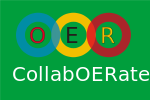OERF:CollabOERate/Concept sandbox
From WikiEducator
Clarifying questions posted via personal email
Note: Waiting for confirmation and permissions to attribute the author
I like the idea of increasing collaboration between OER projects, but I am not totally clear on the role that you see CollabOERate play in that. Would it be a clearing house of projects looking for partners in specific areas, or would there be some facilitation service that would be provided by the OER Foundation? Sorry if I am missing something obvious here ...
Wayne's response
- I don't think you're missing anything -- this is not an intuitive project, its the upside-down thinking associated with the free culture movement which makes this all work :-).
- CollabOERate is very much an emergent concept which I hope thought leaders and practitioners in the free culture will help formulate, refine and make happen in the spirit of open everything. Your questions are very useful in helping me to think through and refine the concept. Thanks for that. You've got me thinking -- so you need to endure a long email ;-).
- I'll post these thoughts up on the CollabOERate hub as a conceptual sandbox as well. (http://wikieducator.org/OERF:CollabOERate )
- The aim of CollabOERate is to fostering the growth of the OER ecosystem through collaborative innovation.
- Think of CollabOERate as the OER equivalent of R&D to find answers to important strategic questions which will help individual projects achieve their aims more effectively. Collaborative "pre-production" research if you will. (It's an open source hack on the traditional corporate R&D model.) The idea is to identify and prioritise strategic projects that will enable OER to leverage the open model for continuous improvement of our field.
- I think the notion of a network (recognising that this is a very restricted metaphor to represent an ecosystem) can help to illustrate the opportunities for change and future success of OER. The Internet is basically pipes and switches. Pipes carry the digital data between A and B. Pipes don't make value judgments -- they just move the knowledge around. The switches (or nodes in the network) make value judgments. They determine who gets access to what, the price etc. The nodes regulate the stream and the flow of the data and where the money gets invested to support projects. In this regard the individual OER projects are the switches in the system. Some are more open than others -- and that's fine. Using this analogy -- CollabOERate is a "pipe" in the ecosystem -- it doesn't want to grow up to be a switch ;-)
- Nope, I don't see CollabOERate as a clearing house for projects or partners -- I think that would be a tad passé ;-) and somewhat obnoxious to think that we have the knowledge and skills to be a clearing house. Personally, I think the open web is a far more effective clearing house.
- Much of the thinking underpinning the CollabOERate concept is based on Michael Gibbon's seminal essay: Higher Education Relevance in the 21st Century. Mode 2 Knowledge production needs different approaches to collaboration when compared to the traditional industrial collaboration models. The value of these strategic CollabOERate projects, lies not so much in the actual outputs of the projects per se (although they will have direct application for our individual OER projects) but more in the experience and knowledge gained by participants through the engagement. It's a space where we can collectively work on finding the answers to pressing questions using strategic demonstrator projects which we would not be able to do on our own.
- One example of a pressing question is sustainability. It is very hard for a single OER project to tackle a demonstrator project on the economics and viability of the long tail OER model on their own. However, we are all interested in the answers so that we can go back to our institutions with the evidence to help grow and sustain our respective projects. Think of CollabOERate as the OER equivalent of the co-opetition model, where we agree to collaborate on certain aspects of the OER ecosystem so that our individual projects do better. The OER Foundation is in a unique space -- we're not pushing any particular projects. Its not in our interests to do that. So this why we subscribe to open philanthropy -- every is open, and that levels the playing field. Everyone is free to use the outputs of what we do for the benefit of their projects.
- The OER Foundation does provide facilitation services to organisations embarking on OER -- simply because of the unique space we move in -- We're an independent non-profit and our core business is to nurture and support the development of sustainable OER ecosystems. So the more nodes (read institutions / projects etc.) we can help create --- the more sustainable the OER ecosystem becomes -- if that makes sense.
- I suppose my explanations are about as clear as mud, and getting this right will be the equivalent of nailing jelly to a tree! But I suspect that bringing together the battle-hardened OER practitioners and thought leaders to figure out how to take our collective endeavour to the next level will deliver dividends. Hope you will help us :-)
- mmm lots to think about -- I going start a collabOERate list on google groups -- If you want to join, just ping me.
- My best wishes for the Easter break.
- Cheers
- Wayne
